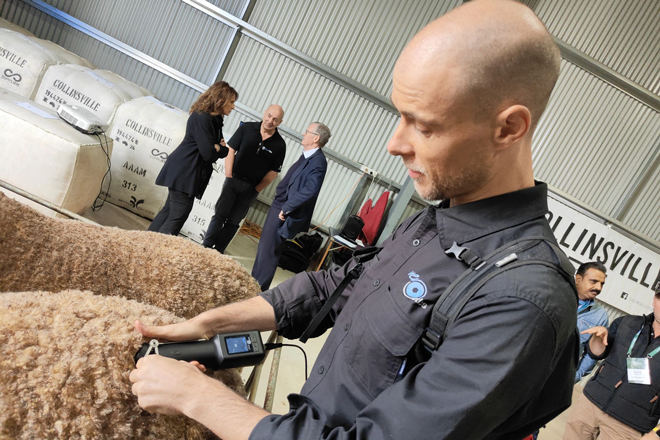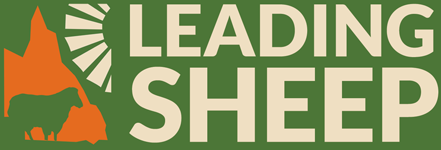- Quick picks: QLD eID rebate, WoolPoll 2024, Australian Wool Traceability Hub, micron testing.
- Deep dive – How wool records sheep stress.
- Upcoming events
- Podcasts, eBulletins and surveys
Quick picks
Queensland Sheep and Goat Electronic Identification (eID) Rebate Scheme: Eligible producers and agents can now apply for the Queensland sheep and goat eID rebate. Up to $1,600 is available per property identification code (PIC) for eID devices (NLIS-accredited eID tags) and eID readers (panel or handheld). Visit the QRIDA website to apply or to read the guidelines. Please contact Leading Sheep if you have questions about the rebate.
Saleyard operators, processors and agricultural show sub-chambers are also eligible for assistance. Visit Business Queensland for more information.

WoolPoll 2024: What will happen when the new woolgrower levy rate is voted in after WoolPoll 2024? What will be prioritised and what might see reduced investment? How will it impact research to support wool’s environmental credentials, wool bioharvesting, flystrike extension activities, international marketing spend and internal parasite research? Be informed before you head to the polls by reading this snapshot of levy options and investment priorities.
Australian Wool Traceability Hub: Major organisations across the wool supply chain have helped shape development of the Australian Wool Traceability Hub (AWTH). The hub aims to strengthen traceability as part of Australia’s emergency animal disease plan and in response to increasing consumer interest in provenance. Tracing product from property to processor will require woolgrowers to include their property identification code (PIC) on their Wool Classer Specification and National Wool Declaration. Read the article in the June 2024 edition of Beyond the Bale or visit the AWTH website to learn more.
Making More From Sheep: Making More From Sheep (MMFS) has been relaunched with new and updated information. The website hosts a wealth of resources on the latest sheep industry research, best practice information, tools and training to support husbandry and management. In addition to the online manual, you can explore podcasts, fact sheets, apps, technologies and industry contacts. Visit the MMFS website or work through the online learning course on the Woolmark Learning Centre platform.
On-farm micron testing: Would you like to be able to test wool micron in the shed or on the sheep’s back? New hand-held technology, which will soon be field tested, allows micron testing to be done on site, in real time, on almost any length of raw wool, without the need for side sampling or waiting for test results. Click here to register your interest as an early adopter or learn more in the latest issue of Beyond the Bale (pg 11). [Image: Beyond the Bale June 2024]

Merinos perform in the AMPC LambEx Carcase Competition: Victoria’s Mooralla Merino Enterprises won the overall top performing lamb producer category in front of more than 1500 delegates at the recent 2024 LambEx Conference. 3 out of 6 awards were won by enterprises with Merino genetics in the largest Meat Standards Australia competition for commercial lambs. Sheep Central captured the results and summarised some of the discussions around carcase grids and supply chain logistics. Read more here.
SALRC Young Achiever Award: Leading Sheep’s very own project manager Andrea McKenzie has won the Young Achiever Award at the Southern Australia Livestock Research Council (SALRC) Livestock 2024 Conference. This award recognises the contribution of people under 35 years old to research, development and extension who are an existing or potential leader in their field. Congratulations Andrea! Leading Sheep is lucky to have you. [Image: SALRC Inc]

Deep dive – How wool records sheep stress.
There is a growing movement towards certified humane and ethically produced wool. Animal welfare and productivity outcomes can be enhanced by researching wool’s biological response to stress and using the information gained to guide on-farm management practices.
Do sheep get stressed?
Yes. Biological stress occurs when sheep face challenging conditions such as extreme weather, poor nutrition or disease. This can impact their overall health and productivity in several ways.
- Health: Chronic stress weakens the immune system, making sheep more prone to illness.
- Reproduction: High stress levels can lower fertility and reduce lambing rates.
- Growth and wool quality: Stress can slow growth and development, reduce body weight and decrease the quality of wool.
Understanding what produces a biological stress response in sheep and addressing these factors can help keep your flocks healthy, resilient and productive. So how can you tell if sheep have experienced stress?
The stress response and how it is recorded in wool
Just as for humans, when sheep are stressed, their bodies activate the hypothalamic-pituitary-adrenal (HPA) axis. Here’s how this works in sheep:
- HPA activation: the brain detects stress and signals the hypothalamus.
↓
- Hormone release: the hypothalamus releases corticotrophin-releasing hormone (CRH), prompting the pituitary gland to release adrenocorticotopic hormone (ACTH).
↓
- Cortisol production: ACTH stimulates the adrenal glands to produce cortisol, the main stress hormone.
Cortisol makes sheep more alert to cope with danger and increases their blood sugar to provide an energy boost. It temporarily reduces inflammation but can suppress immunity if stress is prolonged.
Cortisol is transported from the blood into hair follicles, where it is incorporated into the keratin structure of wool. As wool grows, the history of stress experienced by the animal is effectively recorded by the levels of cortisol extracted every ~10mm (3 to 4 weeks) of growth. Various techniques are used in the lab to extract hormones from wool fibres and quantify them.
Managing for reduced stress
The record of cortisol levels over time can be compared with the flock management calendar to assess whether changes can be made to reduce stress in the future.
- Environmental considerations: Ensure adequate shelter is available where possible, reduce overcrowding and provide proper ventilation to minimise heat stress.
- Nutrition: Maintain a balanced diet rich in essential nutrients to support overall health and increase resilience to stress.
- Gentle handling: Use calm, consistent handling techniques to reduce stress during shearing and other routine practices.
Understanding how stress hormones like cortisol are deposited in wool offers a valuable tool for monitoring sheep stress non-invasively. Identifying practices or conditions that induce stress and impact productivity can guide management decisions. Producers involved in this research found that twice-shorn pregnant ewes had lower long-term stress levels, higher body condition scores and produced lambs with finer wool and higher comfort factor than ewes shorn once. Read more in this Sheep Central article. Wool cortisol analysis can help build understanding of management approaches that enhance welfare and productivity.
Dr Edward Narayan, a senior animal science lecturer at The University of Queensland, presented on this topic at the Leading Sheep Forum in March. With a PhD in stress physiology, he has extensive experience studying animal welfare and stress biomarkers. To follow this research, email Dr Narayan at e.narayan@uq.edu.au or phone 0401 697 287. References for this article can be found here and here.
Upcoming events
- 3 September. Farm business resilience planning workshop, Condamine. Delivered by ConnectAg . For more information and to register click here.
- 3 September. Livestock carbon footprint workshop, Augathella. Delivered by Integrity Ag. For more information and to register click here.
- 4 September. Farm business resilience planning workshop, Westmar. Delivered by ConnectAg . For more information and to register click here.
- 4 September. Integrated Weed Management day ‘ Sommarvia’, Charleville. Delivered by DAF. For more information and to register click here.
- 4 September Containment feeding workshop, Roma. Delivered by DAF. For more information and to register click here.
- 1-3 October. Nutrition EDGE, Winton. Delivered by Desiree Jackson Livestock Management. For more information and to register click here.
Podcasts, eBulletins and surveys
Survey: Drought and Climate Adaptation Program Research
Phillips Group, funded by the Department of Environmental Science, is researching producers’ experiences with planning for drought, including the farm business resilience plan approach. Your participation will help shape future support services for drought and climate resilience and farm management planning. Phillips Group is seeking 70 primary producers from across Queensland who have and have not create farm management plans to participate in a 90-minute interview. Find out more here if you are interested.
- Around the Camp Leading Sheep podcast
- AuctionsPlus Sheep Results and Catalogue
- AWI Beyond the Bale magazine
- AWI The Yarn podcast
- AWI Weekly Wool Market Report
- Farm Biosecurity News
- MLA Prices and Markets
- Sheep Producers Australia News
- Wool Producers Australia News
